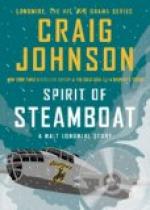“So then I started; an’ first I goed to where my gaff was, by the mother-swile an’ her whelp. There was swiles every two or three yards a’most, old uns an’ young uns, all round everywhere; an’ I feeled shamed in a manner: but I got my gaff, an’ cleaned un, an’ then, in God’s name, I took the big swile, that was dead by its dead whelp, an’ hauled it away, where the t’ other poor things could n’ si’ me, an’ I sculped[11] it, an’ took the pelt;—for I thowt I’d wear un, now the poor dead thing did n’ want to make oose of un no more,—an’ partly becase ’t was sech a lovun thing. An’ so I set out, walkun this way for a spurt, an’ then t’ other way, keepun up mostly a Nor-norwest, so well as I could: sometimes away round th’ open, an’ more times round a lump of ice, an’ more times, agen, off from one an’ on to another, every minute. I did n’ feel hungry, for I drinked fresh water off th’ ice. No schooner! no schooner!
[Footnote 11: Skinned.]
“Bumby the sun was goun down: ’t was slow work feelun my way along, an’ I did n’ want to look about; but then agen I thowt God ’ad made it to be sid; an’ so I come to, an’ turned all round, an’ looked; an’ surely it seemed like another world, someway, ’t was so beautiful,—yellow, an’ different sorts o’ red, like the sky itself in a manner, an’ flashun like glass. So then it comed night; an’ I thowt I should n’ go to bed, an’ I may forget my prayers, an’ so I’d, mubbe, best say ’em right away; an’ so I doned: ‘Lighten our darkness,’ and others we was oosed to say; an’ it comed into my mind, the Lard said to Saint Peter, ‘Why did n’ ‘ee have faith?’ when there was nawthun on the water for un to go on; an’ I had ice under foot,—’t was but frozen water, but ‘t was frozen,—an’ I thanked Un.
“I could n’ help thinkun o’ Brigus an’ them I’d laved in it, an’ then I prayed for ’em; an’ I could n’ help cryun a’most; but then I give over agen, an’ would n’ think, ef I could help it; on’y tryun to say an odd psalm, all through singun-psalms an’ other, for I knowed a many of ’em by singun wi’ Patience, on’y now I cared more about ’em: I said that one,—
‘Sech as in ships an’
brickle barks
Into the seas
descend,
Their merchantun, through
fearful floods,
To compass an’
to end:
They men are force-put to
behold
The Lard’s
works, what they be;
An’ in the dreadful
deep the same
Most marvellous
they see.’




